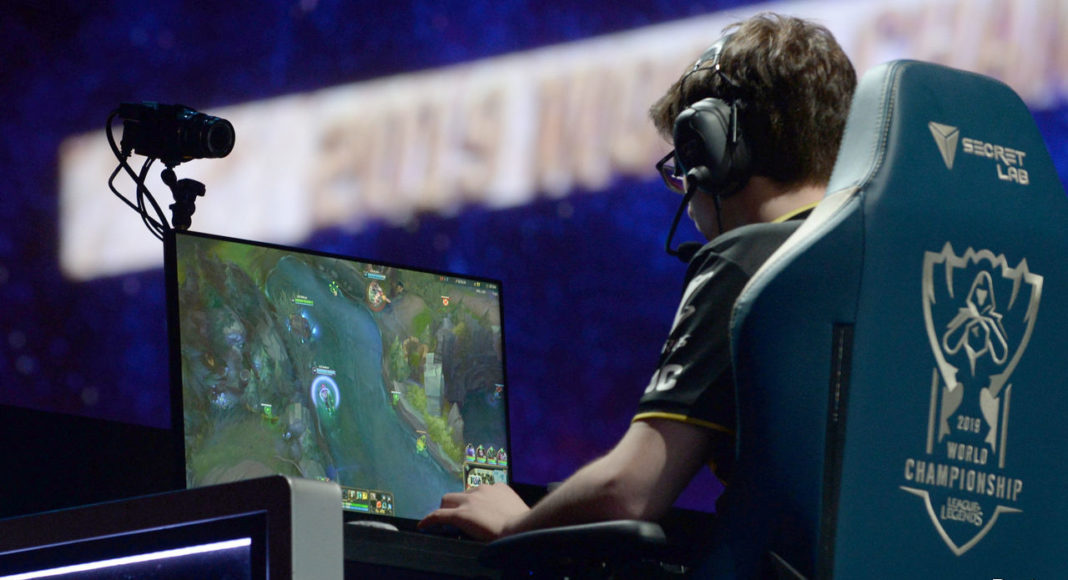E-sports players are reaching huge audiences from their homes; conventional-sports bosses want to do the same
Mar 25th 2020
Editor’s note: The Economist is making some of its most important coverage of the co-19 pandemic freely available to readers of The Economist Today, our daily newsletter. To receive it, register here. For more coverage, see our coronavirus hub
THE LEAGUE was building up to the playoffs. The commentators were on the edge of their seats, breathlessly describing every attack, feint and parry as they analysed the strengths and tactics of the two teams. It might have been any big weekend sports fixture. Except that in the League of Legends Championship (LCS), the field of contest was a virtual world of Tolkienesque monsters. The athletes, as well as the analysts, were all confined to their bedrooms. After a clash of titans lasting 30 minutes on March 21st, Team SoloMid vanquished the Golden Guardians, advancing a step closer to a $200,000 prize pot.
At a time when physical sporting tournaments are being cancelled or postponed around the world because of the co-19 pandemic—including this summer’s Olym in Tokyo—-gaming contests look well placed to claim a larger share of spectators’ attention, and so of advertising dollars. E-sports, in which professional teams play for prestige and prize money, have already been growing impressively in recent years. In 2019 they had a global audience of 443m people, 12% more than in 2018, according to Newzoo, an e-sports-analytics company. Most of these fans are in China and North America.
This reach has gained the attention of brands outside the gaming world. Last year Louis Vuitton, a chic French fashion and luggage house, struck a deal to sponsor the League of Legends world championship in North America. In February Newzoo forecast that the global market for e-sports would exceed $1bn for the first time in 2020, with three-quarters of that coming from sponsorship and media-rights deals.
As with conventional sports, however, co-19 has turned e-sports upside down. Thousands of fans flock to see teams fight it out in real-world arenas, with millions more watching online. Psyonix, the developer of a game called Rocket League, has cancelled its world championships, which were due to be held in Texas next month. Plenty of other organisers have called off fixtures or postponed them indefinitely. “Most e-sports are at their heart live-event productions,” says Chris Greeley, the commissioner of LCS.
The popularity of e-sports relies on proximity to the pros. Fans are able not only to watch their favourite players, but interact with them and play alongside them. “Imagine if LeBron James went home after practice, turned on a camera and shot baskets in his backyard with his fans,” explains Dan Fiden, the president of Cloud9, currently the top team in LCS. Traditional sports are taking note. America’s National Football League has attempted to bridge the gap between athletes and fans by teaming up with Twitter to give users of the social network behind-the-scenes access to games. But such efforts still feel aloof compared with the direct interaction offered by gamers.
Unlike footballers or tennis players, e-sports players do not need to meet face-to-face to compete. This makes the sector uniquely placed to survive the global contagion, and perhaps even thrive. LCS is continuing as an online-only league, with players competing remotely instead of in front of a live audience in Los Angeles. Other competitions are taking a similar approach. “We’ll have players compete from their homes, but in e-sports, unlike any other competition, that really doesn’t change anything at all,” insists Mr Fiden. All that players need is a reliable internet connection.
There are early signs that the pandemic may help e-sports reach new audiences. With the usual fixtures called off, cooped-up fans of mainstream sports are looking elsewhere for entertainment with competitive bite. Mr Greeley notes that, despite the commercial uncertainty, sponsors’ interest has not abated in recent weeks. The number of hours watched on Twitch, which broadcasts both e-sports and amateur gamers, rose by over 20% in the seven days to March 25th, according to Sully Gnome, an analytics website. Some of this increase will come from more casual gamers discovering e-sports. Last week the servers that power League of Legends were almost overwhelmed with demand. Professional players were given special access so that members of the public could at least watch the pros play via streaming sites, even if they could not take part in the game themselves.
As a response to the pandemic, live sports are taking on e-sports directly. In recent days the organisers of NASCAR, Formula 1, La Liga (Spain’s top football league) and Major League Rugby (a competition in North America) have all announced -game contests to replace cancelled fixtures. Formula 1’s “virtual Grand Prix” will see this season’s drivers step out of their cars and into simulators to go wheel-to-wheel on computer-generated tracks. The rugby players, meanwhile, will compete on a virtual pitch. Organisers seem to have given little thought to whether athletes used to the real world will make skilled gamers.
These virtual tournaments point to how desperate organisers are to satisfy audiences in a sporting drought. But they also show a desire to cash in on the popularity of e-sports. Few in the e-sports world see that as a threat. The games that dominate e-sports are not recreations of real-world sports, but more nerdy fare. Strategy and battle games tend to be the most popular. When stadiums reopen, many new e-sports viewers will no doubt return to their stands. But a fair few may stay in the virtual realm.
Dig deeper:For our latest coverage of the co-19 pandemic, register for The Economist Today, our daily newsletter, or visit our coronavirus hub



